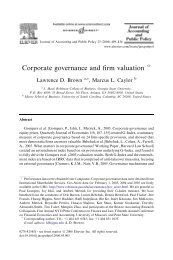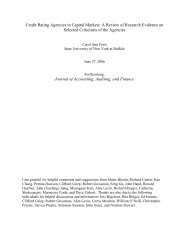Income Dynamics, Economic Rents and the Financialization of the ...
Income Dynamics, Economic Rents and the Financialization of the ...
Income Dynamics, Economic Rents and the Financialization of the ...
Create successful ePaper yourself
Turn your PDF publications into a flip-book with our unique Google optimized e-Paper software.
nancial crisis. Our analyses suggest, however, that employee compensation is only between 26<br />
<strong>and</strong> 40% <strong>of</strong> <strong>the</strong> long-term income transfers into <strong>the</strong> finance sector.<br />
The 2008 collapse <strong>of</strong> <strong>the</strong> finance sector is clearly important in a historical sense. It is also,<br />
potentially a moment <strong>of</strong> rent destruction for this sector. We already know that in 2008 pr<strong>of</strong>its fell<br />
into <strong>the</strong> negative range across <strong>the</strong> industry but rebounded strongly in 2009. Philippon <strong>and</strong> Reshef<br />
(2007) show a tremendous drop in finance sector rents during <strong>and</strong> after <strong>the</strong> Great Depression <strong>of</strong><br />
<strong>the</strong> 1930s. Clearly some <strong>of</strong> this was <strong>the</strong> shock <strong>of</strong> <strong>the</strong> collapse <strong>of</strong> <strong>the</strong> banking system, but much<br />
reflected <strong>the</strong> ensuing regulation <strong>of</strong> <strong>the</strong> industry. Thus <strong>the</strong> contemporary collapse <strong>of</strong> <strong>the</strong> finance<br />
sector <strong>and</strong> re-inflation through <strong>the</strong> federal bailout is likely to be interesting <strong>the</strong>oretically <strong>and</strong> po-<br />
litically as a potential moment <strong>of</strong> rent destruction. At this point we know little about <strong>the</strong> conse-<br />
quences <strong>of</strong> <strong>the</strong> collapse <strong>of</strong> this sector, but sociological rent <strong>the</strong>ory would suggest that politically<br />
more powerful actors (banking, insurance <strong>and</strong> securities) may be able to defend <strong>and</strong> perhaps pre-<br />
serve <strong>the</strong>ir existing market institutions <strong>and</strong> <strong>the</strong> resulting capacity to extract rents. This is certainly<br />
what national politics in late 2009 <strong>and</strong> 2010 looked like. We see repeated media <strong>and</strong> political<br />
attention to <strong>the</strong> high wages <strong>and</strong> bonuses paid to employees in <strong>the</strong> finance industry. We also see<br />
major banks <strong>and</strong> bank holding companies struggling to repay federal bailout money as quickly as<br />
possible, <strong>of</strong>ten rationalized as necessary in order to pay high salaries to <strong>the</strong>ir top employees.<br />
Finally, <strong>and</strong> most consequentially for future income distributions <strong>the</strong>re is a struggle between<br />
banks <strong>and</strong> o<strong>the</strong>r actors over <strong>the</strong> appropriate form <strong>of</strong> new regulations to manage systemic risk <strong>and</strong><br />
protect consumers from rent extraction. What form <strong>the</strong>se regulations take will likely determine<br />
<strong>the</strong> degree to which <strong>the</strong> finance sector will be able to continue to accumulate large proportions <strong>of</strong><br />
<strong>the</strong> national income.<br />
40







